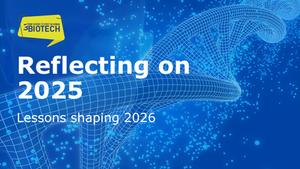top of page



CAR-T CMC strategy under time pressure
Early-stage CAR-T programmes are often driven by urgency. Yet progression to the clinic is rarely constrained by science alone. More often, it is determined by whether manufacturing processes, quality systems and regulatory Chemistry, Manufacturing and Controls (CMC) documentation are ready to support clinical supply. This article explores this, using an emerging biotech developing an autologous CAR-T therapy for oncology.


Biotech at a crossroads: A realistic look back at 2025 and what comes next
A look back at the realities of 2025 and the lessons shaping biotech’s path into 2026 As 2025 draws to a close, biotech finds itself in a complex but defining phase. The pace of scientific innovation is accelerating, especially in discovery and design, but success increasingly hinges on execution, CMC readiness and the ability to move into the clinic efficiently. This contrast between scientific momentum and operational challenge has shaped much of the year. Funding remains a


Why early lead optimisation is holding back biotech and how our new whitepaper can help
Early-stage biotech development has never been more complex. With pressure to move faster, demonstrate robust data earlier, and meet rising regulatory expectations, many teams struggle during one of the most critical phases of the journey: lead optimisation. Today, 3Biotech is pleased to introduce our new whitepaper, Strategic Lead Optimisation and Selection, which explores how early CMC insight can transform development outcomes and reduce risk for small and mid-sized biotec


Why early-stage formulation development is critical for biologics success
Developing a promising biologic candidate is only the first step on the long path to delivering a safe, effective, and commercially...


The importance of QTPP in biotech
Safeguarding safety and efficacy from day one Failing to clearly define quality targets early in biotech development can have serious...


Risk assessment in drug development
Drug development is an inherently high-stakes endeavour, with failure rates in early phases reaching up to 90%. For emerging biotech...


How biotech companies can navigate the tough fundraising climate in 2025
The good news? There’s still plenty of opportunity for companies that prepare well. Here’s what biotech startups need to know to attract...


Introduction to CDMO partnerships
Why biotech companies need the right CDMO partner Biotech companies - particularly early-stage or small-to-mid-sized firms - often face...


How is AI transforming CMC development and what are the key risks and opportunities?
In recent years, Artificial Intelligence (AI) has begun to play a transformative role in the biotechnology and pharmaceutical industries....


3Biotech: the best kept secret in CMC & Pharmaceutical consulting
Biotech innovation doesn’t happen in a vacuum. Behind every successful molecule reaching clinical trials is a seamless CMC strategy...


Opportunities Amidst Adversity: French Biotech in 2024
Olivier Favre-Bulle, founder of 3Biotech , shares his insights on the pressures facing the French biotech sector and the opportunities...


Understanding the Target Product Profile (TPP)
A roadmap for success in Biotech The development of biotech and biological medicines is a highly complex process that goes beyond...


Founding 3Biotech
A Vision to Revolutionize CMC Support for Early-Stage Biotech Founded by Olivier Favre-Bulle in 2014, 3Biotech was born from the desire...


The importance of a robust CMC strategy from the early stages of Biotech development
A well-structured Chemistry, Manufacturing, and Controls (CMC) strategy is essential for the successful development of biologics. For...


3Biotech and Cartelis partnership
3Biotech has announced a new collaboration with Cartelis, a data and CRM operational consulting firm, to explore innovative ways to ...


Olivier Favre-Bullemember of the "Cercle des experts Bpifrance"
Founder and CEO of 3Biotech, Olivier Favre-Bulle was awarded the "Cercle des experts Bpifrance" label at the 9th edition of the BIG...


3Biotech meets Elio Di Rupo
Valuable conversation between Elio di Rupo, Minister-President of Wallonia and former Prime Minister of Belgium, ...


3Biotech x Charleroi BioPark
Dominique Demonte, Head of the Brussels South Charleroi BioPark (Belgium) and Catherine Muller, Executive VP at 3Biotech, have ...


3Biotech joins BioWin
3biotech joins BioWin, Wallonia's biotech research organization...


3Biotech x CIS Pharma
CIS BIOPHARMA is the Basel-based 2023 oncology spinoff from CIS Pharma. Christoph Schäfer,CEO of CIS Pharma, talks about his...


3Biotech x Abcely
Backed by 3Biotech, Nantes-based start-up Abcely, which offers a unique approach to the treatment of mucosal cancers, ...
bottom of page


